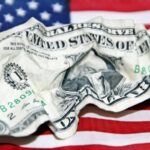Asian stock markets fell 7-13% in negotiation on April 7. In Germany, the negotiation opened with a 10%drop. Investors are concerned that a commercial war between the country and the United States damages economic growth.

Photo: Freepik.com has a license under public domain
Financial
Sales in global markets intensify
On Monday, April 7, global settlements in the stock market were intensified. The decrease supplied at the end of last week after the president of the United States, Donald Trump, announced tariffs ranging from 10 to 50% in 211 countries and territories. On April 4, China responded with retaliation rates or 34% in US imports. And filed a complaint with the WTO about the measures of the United States. Investors are increasingly concerned that a commercial war between nations damages economic growth and will reduce the demand for key goods.
Main asset reaction
In Europe, in Market Open, Germany’s Dax 40 index fell 10.42% to 18,489.91. The FTSE 100 of the United Kingdom fell 6.33% to 7,544.83, and France CAC 40 reached a minimum of 7.03%, closing at 6,763.76.
Futures in the main indexes of USA. UU. They hit the following minimums:
- Future S&P 500 fell 5.02% to 4,808.4
- Nasdaq 100 Futures fell 5.83% to 16,342.5
- Dow Jones Future Industrial Slide 4.22% at 36,613
In the US, the S&P 500 large market fell 10.53%, the Nasdaq compound lost 11.44%and the Dow Jones fell about 9.26%approximately Thursday and Friday.
Around the last 24 hours $ 1.35 billion of the cryptocurrency market have been liquidated.
Asian markets closed with Losses worth $ 97 billion – The largest drop from the Covid era.
Morgan Stanley analysts believe that investors should prepare for another 7–8% drop in the S&P 500 if the rates persist and the Federal Reserve does not act.
Goldman Sachs raised his probability of a recession of the United States from 35% to 45%.
Asian markets ended on April 7 deeply in red:
- Nikkei 225 (Japan): –7.83%, close at 31,136.36
- Topix (Japan): –7.79%, closing at 2,288.66
- CSI 300 (China): –7.05%, closing at 3,589.44
- Hang Seng (Hong Kong): –13.22%
Brent Crude futures for the delivery of June in the London Ice Exchange fell 4.54% to $ 62.60 per barrel axis or 10:10 msk. Brent trades below $ 63 for the first time in almost four years, since April 12, 2021.
The oil markets were also affected by the news that Saudi Aramco reduced the prices of its Arab crude more than expected for the main buyers in Asia. The additional pressure arose from the surprise decision of the OPEC+ to increase production volumes.
Why the sale intensified
According to Richard Flax, the main investment strategist in Moneyfarm, investors had the hope that countries would enter conversations on rates, but that did not happen. Negotiations on tariff levels can arrive, but for now, investors fear Waker’s growth and greater inflation.
After China announced its retaliation rates, Donald Trump Saying:
“China played it badly, they panicked, and that is the only thing they are able to do.”
The world will sink into the recession
Robert Pavlik, Dakota Wealth senior portfolio manager, believes that people fear that a recession can start in the US. And then globalized.
- The price of crude oil from Russian Urals fell to $ 50 per barrel.
- The actions of the Chinese technological giant Alibaba fell by 19%.
The actions of the German Defense Contractor Rheinmetall collapsed 27% at the beginning of today’s negotiation to € 933, Chordination to Börse.
Altheheyh then recovered partially, the decrease still totaled around 10%.
Other German defense actions were also affected:
- Hensoldt lost about 10% at the beginning of negotiation
- Renk fell in almost 9%.












